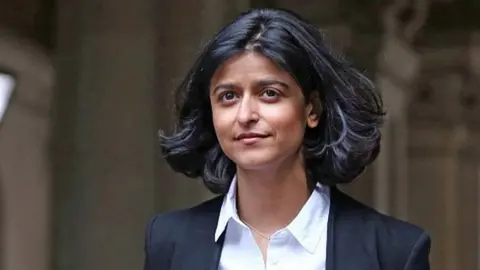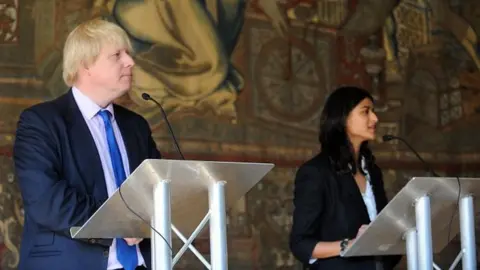Munira Mirza: The student radical who became 'Boris's brain'
 PA Media
PA MediaMunira Mirza, one of Boris Johnson's closest aides, has quit, blaming what she called a "scurrilous" attack by the prime minister on Labour leader Sir Keir Starmer. But who is she?
For 14 years Munira Mirza has been at Boris Johnson's side. Through all the tribulations of his time as London mayor, Brexit campaigner, foreign secretary and prime minister, she has been a source of advice, willing and able to challenge her boss.
Ms Mirza, sometimes known as "Boris's brain", is far from being a lifelong Conservative, having once been a communist activist.
The 43-year-old factory worker's daughter, brought up in Oldham, also comes from a very different background to Old Etonian Mr Johnson.
Like most advisers, she is not usually in the public eye. But in 2018 she wrote an article defending Mr Johnson after he said Muslim women wearing burkas "look like letter boxes" and was accused of Islamophobia.
"He knows far more about Islam and Islamic cultures than most of the politicians who are now lining up to attack him," she wrote on the Conservative Home website.
 Islington Boxing Club
Islington Boxing ClubBut Mr Johnson's attack on Sir Keir Starmer in the Commons last week - in which he falsely said the Labour leader, a former director of public prosecutions, had failed to prosecute the serial paedophile Sir Jimmy Savile - was not something she deemed defensible.
"This was not the usual cut and thrust of politics; it was an inappropriate and partisan reference to a horrendous case of child sex abuse," she wrote in her resignation letter, published in the Spectator magazine.
'Desperately sad'
Even then, Ms Mirza appears to retain much of her admiration for Mr Johnson, tinged by disappointment.
"You are a better man than many of your detractors will ever understand, which is why it is so desperately sad that you let yourself down by making a scurrilous accusation against the leader of the opposition," she wrote.
Ms Mirza was closer to Mr Johnson than the other senior officials who have resigned from Downing Street amid the ongoing furore over parties held during lockdown - director of communications Jack Doyle, chief of staff Dan Rosenfield, policy adviser Elena Narozanski and the prime minister's principal private secretary, Martin Reynolds.
Ms Narozanski - an education specialist and amateur boxer - was involved in schools projects when Mr Johnson was London mayor and was a close ally of Ms Mirza.
For a politician often regarded as a loner, despite his clubbable persona, Ms Mirza's departure is a big loss to the prime minister - an independent voice gone from the sometimes rather sealed world of Downing Street.
 PA Media
PA MediaBorn in 1978 to parents who had come to the UK from Pakistan, Ms Mirza went to a comprehensive school before studying English at Oxford University.
While there she joined the Revolutionary Communist Party, but during her twenties, frustrated at what she thought to be a lack of free thought on the far left, she went through an ideological transformation.
Having completed a PhD in sociology at the University of Kent, she started work for Policy Exchange, the think tank set up by Conservatives Michael Gove, Francis Maude and Nick Boles.
'Too late for me'
Her intellectual independence was noticed by Mr Johnson, for whom she started working as an arts adviser - having spent time at the Tate Gallery and the Royal Society of Arts - when he was London mayor.
She was later promoted to become deputy mayor in charge of education and culture.
Ms Mirza has stayed by Mr Johnson's side until now, being made head of the No 10 policy unit when he became prime minister in 2019.
She was involved in the manifesto which helped the Conservatives to a landslide general election victory later that year, taking many traditional Labour seats in northern England and the Midlands with promises to "get Brexit done", "level up" the UK and put more money into the NHS, policing and schools.
Just over two years after that enormous political high, Ms Mirza leaves Downing Street projecting a sense not of fury, but of regret and frustration at the PM's comment on Sir Keir.
"I appreciate that our political culture is not forgiving when people say sorry," she wrote in her resignation letter, "but regardless, it is the right thing to do. It is not too late for you but, I'm sorry to say, it is too late for me."
